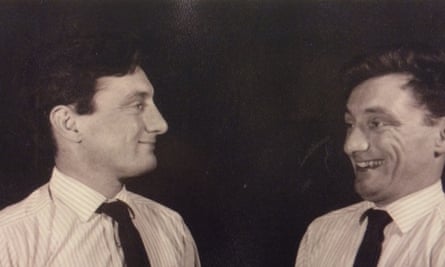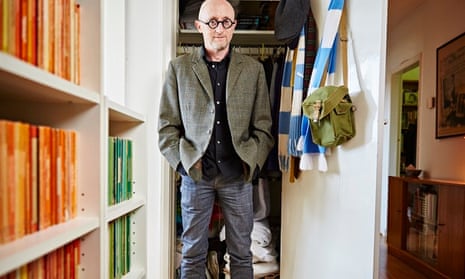I’m standing in a bar in Manchester reading a short story about fathers and sons to a warmed-up Chorlton arts festival audience. I’m wearing my dad’s black, button-down Crimplene shirt, his dark green tweed Maenson jacket in “pure new wool”, one of his narrow Terylene and wool ties and his HM Customs official-issue steel-toecapped black work boots with special rubber grip to prevent slipping on greasy dockside wharves. The thing is, I am not even making a special effort to dress like my dad – apart, perhaps, from the tie.
The green jacket is the top half of a suit. Unfortunately, the moths have been at the bottom half. They have been at the jacket too, but it’s easier to carry off holes in a jacket than in trousers. Anyway, the trousers require braces and those would feel like a step too far on the road towards hipster fetishism.
For me it’s not about recreating the 1960s so much as feeling close to my dad, who was the same height as me, but a couple of sizes bigger around the waist. I’ve been wearing his clothes for years, not in any rigorously schematic or timetabled way – it’s Tuesday, so I must wear the blue Tootal scarf – but when I reach for a jacket I’m just as likely to grab one of my dad’s as one of mine. If it looks like rain, I’ll choose between his long navy Listarock raincoat and his cream St Michael mac, straight out of The Ipcress File.
Russell Royle was a husband, father (to me and my two sisters), Customs officer, jazz fan, amateur photographer, weekend sailor and full-time hypochondriac and, like all hypochondriacs, was ultimately proved right. Born in 1930 in Manchester, he met my mum, then Jean Hardman, in 1947 when they were working for the War Damage Commission. He served as a Royal Marine and wrote from his cabin on board HMS Anson to Albert Hardman asking for permission to marry his daughter. They were married in 1952.
One day in 1963, when I was a few months old, my mum took me out in my pram, leaving Russell in bed with a sore throat. When we returned she noticed his ashtray had disappeared and with it the smell of cigarettes. It turned out my dad had stopped smoking overnight after hearing a report on the radio linking smoking to lung cancer.
Cancer was his bugbear. In our house – and, I think, widely in the 1970s, when I was growing up – the word cancer was mouthed more often than it was spoken aloud. My dad thought he had it here, there and everywhere. I remember him being relieved when he was hospitalised with gallstones.
Finally, two years into retirement in 1992, he was diagnosed with non-Hodgkin lymphoma. He suffered, horribly, and died in September 1994. As a result, what had been a sort of macabre hobby of mine, indulging in the odd bout of health anxiety, graduated to a near obsessive level and, like my dad, I was pretty much focused on one thing. Moving to live a mile down the road from a world-renowned cancer centre, the Christie hospital, probably wasn’t a great move.
It’s not as if I’ve ever needed to be reminded about mortality. I’ve worn down a path to the GP surgery. In the past 10 years, I’ve had imaginary cancers everywhere imaginable. I think it was a bereavement counsellor, or one of a number of other therapists, who told me about learned behaviour. Thanks, Dad, although you weren’t to know.

Perhaps if I mothballed his clothes and bought a load of new gear I’d be able to move on. But then would I also have to stop listening to his music – Thelonious Monk, Mose Allison, Blossom Dearie – and taking trick photographs like the multiple exposure he took of himself in the late 1960s that inspired my fascination with doppelgangers and the uncanny? The truth is, I have always felt rather pleased whenever my mum has said, looking at photographs of me, “Ooh, you look just like your dad.”
He may never have lost his hair – not until he had radiotherapy – but there’s a resemblance, and I know when I pull a certain face if I look in the mirror I’ll see my dad looking back at me.
The truth is, I started wearing his stuff long before he became ill. I remember a Harris tweed jacket that swamped me, an equally generous beige V-neck sweater and a yellow woollen scarf from which I could not be separated until I left it on the underground during my first year at university. Fast-forward three decades to my own son, Charlie, 18, raiding my wardrobe for the large Jigsaw moleskin shirt and baggy long-sleeved tops I favoured in the 1990s and which fit him perfectly since he shot past me. His 16-year-old sister, Bella, is no slouch either and looks much better in my blue R Newbold ex-GPO work shirt and Wahler Dutch army jacket than I ever did.
Rather than worrying that my children wearing my clothes means I’m heading for the family plot any time soon, I’m happy to see this passing on of … if not jeans, then just about every other type of clothing. Although Charlie and Bella never met their paternal grandad, I take consolation from seeing my son come out of the bathroom wearing my dad’s Tricel dressing gown.
If there is something in this pattern of repeating behaviour that does concern me, however, it is that I probably feel closer to my dad now, more than 20 years after his death, than I did when he was alive. I love the music he loved and am better acquainted than I would like to be with the fear he lived with for many years. I have my own children to worry about, as he had his. There was no shortage of love and affection in the Royle family, but how much did he feel he got back from me? There may be no use in regrets, but I do regret things left unsaid. When our relationship was formed it was a different time but I could and should have told him, when he was dying, that I loved him.
I hope that my children will still feel close to me 20 years after I am gone, but the important word there is “still”. I want them to feel close to me now. Do I tell them I love them? Maybe not in as many words as often as I should. Do I show them? I hope I do.
There’s an adage that fiction writers live by, perhaps especially teachers of creative writing: show, don’t tell. And while there are some things it may be better not to show – rampant health anxiety for example – love isn’t one of them.
But reality is not fiction, as much as I might enjoy creating fiction out of reality, often blurring the boundary between the two, and there are times in life when it wouldn’t hurt to reinforce one’s showing with a bit of telling.
The caption to the second photograph was corrected on 25 July to clarify that it shows two views of Nicholas Royle’s father, Russell, not father and son.

Comments (…)
Sign in or create your Guardian account to join the discussion